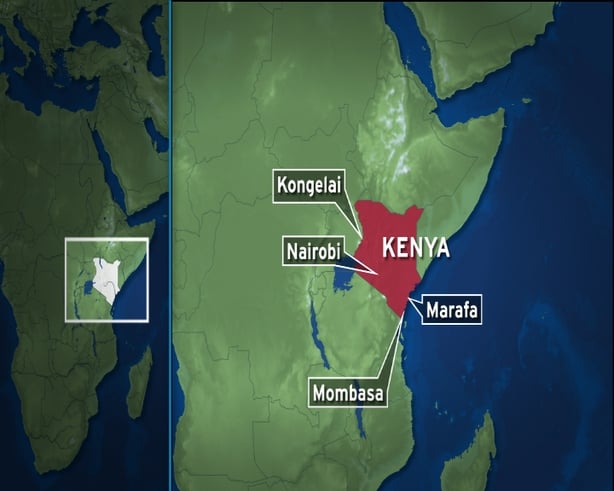Under a tree in remote sub-Saharan Africa, a revolution is taking place.
 RTÉ's Gavin Jennings reports from Kenya
RTÉ's Gavin Jennings reports from Kenya
This is Kongelai - a village in West Pokot, Kenya.
The land is dry and getting drier. There will be rain soon, but every year there's less of it.
After a two-hour bone shaking drive by jeep away from the main roads, I meet Maria, Jenna, Susan and their neighbours gathering under a tree.
They're angry and they're determined.
In Swahili, Maria tells me why. When she was 12, she was cut.
There was a two-day ceremony held to mark her coming of age. The women in her village made a fuss of her. Neighbours came with food and a goat was slaughtered.
An elderly woman chopped Maria's genitals with a razor, sealed the wound with honey and herbs and sewed what was left to leave a tiny opening.
"I was told to be brave" she tells me, "but it was very painful.
If I screamed, they would laugh at me and tell me that no man would want me."
After the ceremony, she was a woman, ready to be married off to a man. A much older man. Whoever offered the most cattle for her.
The small opening left behind would be expanded to allow for her new husband - with a heated horn.
Cut, married off and very quickly pregnant, Maria lost her child.
Her young body had been so damaged by the cut, the baby got stuck and died.
She couldn't have any more children and her husband threw her out.
Cutting, or female genital mutilation, is illegal in Kenya now - it was made so under an ambitious constitution overwhelmingly backed in a public vote three years ago.
By the end of last year, just over one in four Kenyan women had been cut, but in remote villages like Kongelai the rate is up to 90%.
All of the women here have been cut, but they're keeping their daughters away. Girls are sent to school and when a girl doesn't show up at school, the women go looking for her.
Susan points to the hills in the distance - the border with Uganda.
They go there to be cut, she tells me.
Why? Because they don't know any different. The girls want to be mature and to be accepted, while their parents want the dowry.
But its against the law, I say. Jenna waves her arm around and asks who's going to stop them out here. "We will" she says.
The group has been trained in education, the law and business with the help of Action Aid and €200,000 of Irish taxpayers money last year.
The law says their daughters aren't allowed to be cut or stigmatised for not being cut.
That they can't get married under the age of 18 and that they must stay in school until 18.
That they can inherit and own their own land and that they must be represented in all government institutions and large private companies.
There are women's groups like this one all over the country.

On the east coast over 1,000km away I meet the women of Sauti - or "the voice".
In Zina la Ngo/Mbe, a large slum in Mombasa, Elizabeth, Abigail and Margaret say that implementing the law is difficult. Both men and women are very slow to change - men are scared while women are still being attacked and staying quiet.
They point to a quarry in the distance, past the thousands of people crammed together on streets filled with raw sewage, skinny goats sifting through the rubbish and the smell of petrol fumes.
It's a dangerous place, Elizabeth tells me. Young girls are raped and left to die there.
She says it is their job to help them, to bring them to hospital, the police and the courts.
The attackers seek revenge while the girls seek shelter, like the one run by Joyce Damaka another two hours inland in Marafa.
The women roar laughing when I suggest that its hard to imagine determined women like them being subjugated by men.
A revolution to uphold the law is under way.
Kenya is changing but it's going to take time.
All of Gavin Jennings' interviews from Kenya can be found on Soundcloud here.

